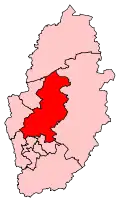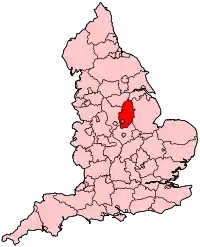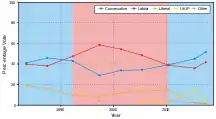Sherwood (UK Parliament constituency)
Sherwood is a constituency[n 1] represented in the House of Commons of the UK Parliament since 2010 by Mark Spencer, a Conservative.[n 2] The constituency takes its name from the Sherwood Forest which is in the area.
| Sherwood | |
|---|---|
| County constituency for the House of Commons | |
 Boundary of Sherwood in Nottinghamshire | |
 Location of Nottinghamshire within England | |
| County | Nottinghamshire |
| Electorate | 72,111 (December 2010)[1] |
| Major settlements | Hucknall |
| Current constituency | |
| Created | 1983 |
| Member of Parliament | Mark Spencer (Conservative) |
| Seats | One |
| Created from | Newark, Carlton, Ashfield |
Under the 2023 Periodic Review of Westminster constituencies, the constituency will only be subject to minor boundary changes, but is to be renamed Sherwood Forest - to be first contested at the next general election.[2]
Boundaries
1983–1997: The District of Newark wards of Bilsthorpe, Blidworth, Boughton, Clipstone, Dover Beck, Edwinstowe, Farnsfield, Fishpool, Lowdham, Ollerton North, Ollerton South, Rainworth, and Rufford, the District of Ashfield wards of Hucknall Central, Hucknall East, Hucknall North, and Hucknall West, and the Borough of Gedling wards of Bestwood St Albans (Bestwood Village only), Calverton, Lambley, Newstead, and Woodborough.
1997–2010: The District of Newark and Sherwood wards of Bilsthorpe, Blidworth, Boughton, Clipstone, Dover Beck, Edwinstowe, Farnsfield, Lowdham, Ollerton North, Ollerton South, Rainworth, and Rufford, the District of Ashfield wards of Hucknall Central, Hucknall East, Hucknall North, and Hucknall West, and the Borough of Gedling wards of Bestwood Park, Calverton, Lambley, Newstead, Ravenshead, and Woodborough.
2010–present: The District of Newark and Sherwood wards of Bilsthorpe, Blidworth, Boughton, Clipstone, Edwinstowe, Farnsfield, Ollerton, and Rainworth, the District of Ashfield wards of Hucknall Central, Hucknall East, Hucknall North, and Hucknall West, and the Borough of Gedling wards of Bestwood Village, Calverton, Lambley, Newstead, Ravenshead, and Woodborough.
The constituency is in central Nottinghamshire, covering parts of three local government authorities: the Ashfield district, parts of the Gedling borough, and the western part of the Newark and Sherwood district, the largest geographical area of the seat.
Constituency profile
The seat name refers to the Sherwood Forest, world famous for its association with the legend of Robin Hood. The seat is an area of contrasts such as Ravenshead, home to some of Nottinghamshire's most affluent residents, numerous smaller rural villages, one mining village and many ex-mining villages, and the town of Hucknall, the largest in the constituency, now a commuter town, but one which remains involved with mining. Thoresby, Edwinstowe once contained a large operational coal mine underground. It does not contain the Nottingham City ward of Sherwood, which is further south, within the Nottingham East constituency.
- In statistics
The constituency consists of Census Output Areas of three local government districts with similar characteristics: a working population whose income is close to the national average, and lower than average reliance upon social housing.[3] At the end of 2012, the unemployment rate in the constituency stood as 3.5% of the population claiming jobseekers allowance, compared to an identical regional average which was below the national average.[4] Taking the part of Newark and Sherwood that contributes to the seat: a slightly below average 18.6% of its population are without a car, a medium 25.1% of the population are without qualifications and a high 24.2% have level 4 qualifications or above (2011). In terms of tenure, 70.2% of homes are owned outright or on a mortgage by occupants as at the 2011 census across that district.[5]
History
On the constituency's creation in 1983, Andy Stewart gained the seat for the Conservatives in their landslide victory that year with a small majority of 658. The Nottinghamshire miners drifted further from Labour during the 1984 strike and Stewart was re-elected with an increased majority in 1987. However, in 1992 the seat was gained for Labour by Paddy Tipping, who held it until he retired in 2010, when the seat was regained for the Conservatives by Mark Spencer, by a majority of 214. In 2015, Spencer's lead over the second placed candidate increased to 4,647 votes. This further increased in 2017 and another big swing to the Conservatives in 2019 saw Spencer's majority increase to 16,186, the first time a Conservative had a five-figure majority in the seat.[6]
Members of Parliament
| Election | Member[7] | Party | |
|---|---|---|---|
| 1983 | Andy Stewart | Conservative | |
| 1992 | Paddy Tipping | Labour | |
| 2010 | Mark Spencer | Conservative | |
Elections

Elections in the 2010s
| Party | Candidate | Votes | % | ±% | |
|---|---|---|---|---|---|
| Conservative | Mark Spencer | 32,049 | 60.8 | ||
| Labour | Jerry Hague | 15,863 | 30.1 | ||
| Liberal Democrats | Tim Ball | 2,883 | 5.5 | ||
| Green | Esther Cropper | 1,214 | 2.3 | ||
| Independent | Simon Rood | 700 | 1.3 | New | |
| Majority | 16,186 | 30.7 | |||
| Turnout | 52,709 | 67.6 | |||
| Conservative hold | Swing | ||||
| Party | Candidate | Votes | % | ±% | |
|---|---|---|---|---|---|
| Conservative | Mark Spencer | 27,492 | 51.5 | ||
| Labour | Mike Pringle | 22,294 | 41.8 | ||
| UKIP | Stuart Bestwick | 1,801 | 3.4 | ||
| Liberal Democrats | Becky Thomas[9] | 1,113 | 2.1 | ||
| Green | Morris Findley | 664 | 1.2 | ||
| Majority | 5,198 | 9.7 | |||
| Turnout | 53,364 | 70.2 | |||
| Conservative hold | Swing | ||||
| Party | Candidate | Votes | % | ±% | |
|---|---|---|---|---|---|
| Conservative | Mark Spencer | 22,833 | 45.0 | +5.8 | |
| Labour | Léonie Mathers | 18,186 | 35.9 | −2.9 | |
| UKIP | Sally Chadd[12] | 7,399 | 14.6 | +11.6 | |
| Green | Lydia Davies-Bright[13] | 1,108 | 2.2 | New | |
| Liberal Democrats | Dan Mosley[14] | 1,094 | 2.2 | −12.7 | |
| Class War | Dave Perkins | 78 | 0.2 | New | |
| Majority | 4,647 | 9.1 | +8.7 | ||
| Turnout | 50,698 | 69.1 | +0.2 | ||
| Conservative hold | Swing | +4.4 | |||
| Party | Candidate | Votes | % | ±% | |
|---|---|---|---|---|---|
| Conservative | Mark Spencer | 19,211 | 39.2 | +5.8 | |
| Labour | Emilie Oldknow | 18,997 | 38.8 | −10.6 | |
| Liberal Democrats | Kevin Moore | 7,283 | 14.9 | +1.4 | |
| BNP | James North | 1,754 | 3.6 | New | |
| UKIP | Margot Parker | 1,490 | 3.0 | −0.7 | |
| NOTA (None of the Above) | Russ Swan [17] | 219 | 0.4 | New | |
| Majority | 214 | 0.4 | N/A | ||
| Turnout | 48,954 | 68.9 | +7.1 | ||
| Conservative gain from Labour | Swing | +8.2 | |||
Elections in the 2000s
| Party | Candidate | Votes | % | ±% | |
|---|---|---|---|---|---|
| Labour | Paddy Tipping | 22,824 | 48.4 | −5.8 | |
| Conservative | Bruce Laughton | 16,172 | 34.3 | +0.5 | |
| Liberal Democrats | Peter Harris | 6,384 | 13.5 | +1.6 | |
| UKIP | Moritz Dawkins | 1,737 | 3.7 | New | |
| Majority | 6,652 | 14.1 | -6.3 | ||
| Turnout | 47,117 | 62.8 | +2.1 | ||
| Labour hold | Swing | −3.1 | |||
| Party | Candidate | Votes | % | ±% | |
|---|---|---|---|---|---|
| Labour | Paddy Tipping | 24,900 | 54.2 | −4.3 | |
| Conservative | Brandon Lewis | 15,527 | 33.8 | +5.0 | |
| Liberal Democrats | Peter Harris | 5,473 | 11.9 | +3.3 | |
| Majority | 9,373 | 20.4 | -9.3 | ||
| Turnout | 45,900 | 60.7 | −14.9 | ||
| Labour hold | Swing | ||||
Elections in the 1990s
| Party | Candidate | Votes | % | ±% | |
|---|---|---|---|---|---|
| Labour | Paddy Tipping | 33,071 | 58.5 | +11.0 | |
| Conservative | Roland Spencer | 16,259 | 28.8 | −14.1 | |
| Liberal Democrats | Bruce Moult | 4,889 | 8.6 | −1.0 | |
| Referendum | Lee Slack | 1,882 | 3.3 | New | |
| BNP | Paul Ballard | 432 | 0.8 | New | |
| Majority | 16,812 | 29.7 | +25.1 | ||
| Turnout | 56,533 | 75.6 | −9.9 | ||
| Labour hold | Swing | ||||
| Party | Candidate | Votes | % | ±% | |
|---|---|---|---|---|---|
| Labour | Paddy Tipping | 29,788 | 47.5 | +9.3 | |
| Conservative | Andy Stewart | 26,878 | 42.9 | −3.0 | |
| Liberal Democrats | JW Howard | 6,039 | 9.6 | −6.4 | |
| Majority | 2,910 | 4.6 | N/A | ||
| Turnout | 62,705 | 85.5 | +3.6 | ||
| Labour gain from Conservative | Swing | +6.2 | |||
Elections in the 1980s
| Party | Candidate | Votes | % | ±% | |
|---|---|---|---|---|---|
| Conservative | Andy Stewart | 26,816 | 45.9 | +4.9 | |
| Labour | William Bach | 22,321 | 38.2 | -1.5 | |
| SDP | Stuart Thompstone | 9,343 | 16.0 | -3.3 | |
| Majority | 4,495 | 7.7 | +6.4 | ||
| Turnout | 58,480 | 81.9 | +5.6 | ||
| Conservative hold | Swing | ||||
| Party | Candidate | Votes | % | ±% | |
|---|---|---|---|---|---|
| Conservative | Andy Stewart | 21,595 | 41.0 | ||
| Labour | William Bach | 20,937 | 39.7 | ||
| SDP | Margaret E. Cooper | 10,172 | 19.3 | ||
| Majority | 658 | 1.3 | |||
| Turnout | 52,704 | 76.3 | |||
| Conservative win (new seat) | |||||
Notes
- A county constituency (for the purposes of election expenses and type of returning officer)
- As with all constituencies, the constituency elects one Member of Parliament (MP) by the first past the post system of election at least every five years.
References
- "Electorate Figures - Boundary Commission for England". 2011 Electorate Figures. Boundary Commission for England. 4 March 2011. Archived from the original on 6 November 2010. Retrieved 13 March 2011.
- "East Midlands | Boundary Commission for England". boundarycommissionforengland.independent.gov.uk. Retrieved 6 April 2023.
- "Local statistics - Office for National Statistics". www.ons.gov.uk.
- Unemployment claimants by constituency The Guardian
- "2011 census interactive maps". Archived from the original on 29 January 2016.
- The Times Guide to the House of Commons 2019. Glasgow: Times Books. 2020. p. 328. ISBN 978-0-00-839258-1.
- Leigh Rayment's Historical List of MPs – Constituencies beginning with "S" (part 3)
- "Sherwood Parliamentary constituency". BBC News. BBC. Retrieved 21 November 2019.
- "Becky Thomas". Archived from the original on 21 April 2017.
- "Election Data 2015". Electoral Calculus. Archived from the original on 17 October 2015. Retrieved 17 October 2015.
- "Sherwood parliamentary constituency - Election 2017" – via www.bbc.co.uk.
- "SOPN%20and%20Notice%20of%20Poll_Sherwood_070515.pdf" (PDF). Archived from the original (PDF) on 14 May 2015. Retrieved 11 April 2015.
- "Prospective General Election Candidates | Green Party". Green Party Members' Website.
- "Dan Mosley". East Midlands Lib Dems. Retrieved 19 January 2015.
- "Election Data 2010". Electoral Calculus. Archived from the original on 26 July 2013. Retrieved 17 October 2015.
- "BBC News | Election 2010 | Constituency | Sherwood". news.bbc.co.uk.
- http://noneoftheaboveparty.wordpress.com/2010/04/11/introducing-the-candidates-russ-swan/%5B%5D
- "Election Data 2005". Electoral Calculus. Archived from the original on 15 October 2011. Retrieved 18 October 2015.
- "Election Data 2001". Electoral Calculus. Archived from the original on 15 October 2011. Retrieved 18 October 2015.
- "Election Data 1997". Electoral Calculus. Archived from the original on 15 October 2011. Retrieved 18 October 2015.
- "Election Data 1992". Electoral Calculus. Archived from the original on 15 October 2011. Retrieved 18 October 2015.
- "Politics Resources". Election 1992. Politics Resources. 9 April 1992. Retrieved 6 December 2010.
- "Election Data 1987". Electoral Calculus. Archived from the original on 15 October 2011. Retrieved 18 October 2015.
- "Election Data 1983". Electoral Calculus. Archived from the original on 15 October 2011. Retrieved 18 October 2015.